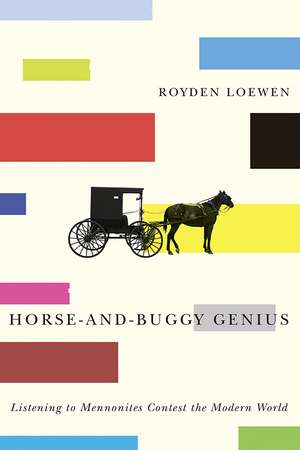Horse-and-Buggy Genius: Listening to Mennonites Contest the Modern World
Autor Royden Loewenen Limba Engleză Paperback – 16 apr 2016
The history of the twentieth century is one of modernization, a story of old ways being left behind. Many traditionalist Mennonites rejected these changes, especially the automobile, which they regarded as a symbol of pride and individualism. They became known as a “horse-and-buggy” people.
Between 2009 and 2012, Royden Loewen and a team of researchers interviewed 250 Mennonites in thirty-five communities across the Americas about the impact of the modern world on their lives. This book records their responses and strategies for resisting the very things—ease, technology, upward mobility, consumption—that most people today take for granted.
Loewen’s subjects are drawn from two distinctive groups: 6,000 Old Order Mennonites, who continue to pursue old ways in highly urbanized southern Ontario, and 60,000 Old Colony Mennonites, whose history of migration to protect traditional ways has taken them from the Canadian prairies to Mexico and farther south to Belize, Paraguay, and Bolivia.
Whether they live in the shadow of an urban, industrial belt or in more isolated, rural communities, the fundamental approach of “horse-and-buggy” Mennonites is the same: life is best when it is kept simple, lived out in the local, close to nature. This equation is the genius at the heart of their world.
Between 2009 and 2012, Royden Loewen and a team of researchers interviewed 250 Mennonites in thirty-five communities across the Americas about the impact of the modern world on their lives. This book records their responses and strategies for resisting the very things—ease, technology, upward mobility, consumption—that most people today take for granted.
Loewen’s subjects are drawn from two distinctive groups: 6,000 Old Order Mennonites, who continue to pursue old ways in highly urbanized southern Ontario, and 60,000 Old Colony Mennonites, whose history of migration to protect traditional ways has taken them from the Canadian prairies to Mexico and farther south to Belize, Paraguay, and Bolivia.
Whether they live in the shadow of an urban, industrial belt or in more isolated, rural communities, the fundamental approach of “horse-and-buggy” Mennonites is the same: life is best when it is kept simple, lived out in the local, close to nature. This equation is the genius at the heart of their world.
| Toate formatele și edițiile | Preț | Express |
|---|---|---|
| Paperback (1) | 179.27 lei 3-5 săpt. | |
| University of Manitoba Press – 16 apr 2016 | 179.27 lei 3-5 săpt. | |
| Hardback (1) | 492.04 lei 6-8 săpt. | |
| University of Manitoba Press – 3 mai 2016 | 492.04 lei 6-8 săpt. |
Preț: 179.27 lei
Nou
Puncte Express: 269
Preț estimativ în valută:
34.31€ • 35.55$ • 28.63£
34.31€ • 35.55$ • 28.63£
Carte disponibilă
Livrare economică 01-15 martie
Preluare comenzi: 021 569.72.76
Specificații
ISBN-13: 9780887557989
ISBN-10: 0887557988
Pagini: 240
Dimensiuni: 152 x 229 x 18 mm
Greutate: 0.36 kg
Ediția:1
Editura: University of Manitoba Press
Colecția University of Manitoba Press
ISBN-10: 0887557988
Pagini: 240
Dimensiuni: 152 x 229 x 18 mm
Greutate: 0.36 kg
Ediția:1
Editura: University of Manitoba Press
Colecția University of Manitoba Press
Notă biografică
Royden Loewen is a professor of history and Chair of Mennonite Studies at the University of Winnipeg.
Descriere
The history of the twentieth century is one of modernization, but traditionalist Mennonites have rejected changes they see as symbols of pride and individualism, especially the automobile. In this study, 250 “horse-and-buggy” Mennonites in thirty-five communities in Ontario and Latin America reflect on the impact of the modern world on their lives and their strategies for contesting it. Their collective appeal to a life of simplicity is the genius at the heart of their world.
